UP Law Center Workers and Employees Program (WEP) Holds First Roundtable Discussion with Various Labor Groups
The newly-instituted Workers and Employees Program of the University of the Philippines Law Center conducted its launching event, the First WEP Online Round Table Discussion last October 23, 2021. Aptly entitled “Workers and Employees Empowerment: Working Together,” the event was attended by 31 personalities, majority of whom represented labor unions and federations, labor-related organizations and government agencies, and included policy experts, labor practitioners and academics.
The RTD was graced by UP College of Law Dean Edgardo Carlo L. Vistan II who delivered the Welcoming Remarks, characterizing the event as the organization’s maiden voyage in its advocacies to dissect labor issues and to address the plight of workers and employees as exacerbated by the global pandemic.
This was followed by the Labor Undersecretary, the Hon. Benjo Santos M. Benavidez’s Opening Remarks. Congratulating the women and men behind the WEP initiative, he pointed out two key labor agenda matters that may need Labor Code revisions: One, the reality that the informal sector workers are not considered employees despite deserving decent work, and two, the effectiveness of the specific remedies and penalties for violation of employees’ rights that usually take several years before a final verdict is rendered.
Program Director, Prof. Patricia R.P. Salvador Daway then formally introduced WEP, its vision, mission and goal. Primarily, WEP will work for workers and employees’ rights and welfare in collaboration with workers and employees, labor organizations, NGOs, and government entities in developing an empowered and enlightened labor sector. Prof. Daway expressed the hope that WEP will ultimately evolve into a national labor center dedicated to excellence in research and publication, consultancy, training and capacity-building leading to accreditation and the grant of non-degree programs in the field of labor law amidst emerging trends.
Prof. Evelyn (Leo) D. Battad presented the salient features of five (5) bills which are under consideration in the 18th Congress and which are likely to prosper. These are the Act Creating the Department of Migrant Workers and Overseas Filipinos, the Eddie Garcia Law, An Act Increasing the Service Incentive Leave of Employees, the Security of Tenure and End of Endo Act, and the Calamity Leave Law.
The plenary session was moderated by Prof. Arnold F. de Vera who accentuated the objectives of WEP that go beyond policy advocacy and clarified the need to set priorities for a comprehensive and in-depth discussion of the relevant bills.
Hon. Ferdinand R. Gaite of Bayan Muna Partylist highlighted the need for a national minimum wage to replace the current minimum wage set by region, adding that while the government is the biggest employer, it is not the best in addressing job security. He added that his group is pushing for bills related to OFWs, media, and health workers.
The individual participants and representatives of organizations and labor centers then raised a variety of concerns, to wit:
The Director of the Centre for Migrant Advocacy, Ellene Sana said that while CMA strongly opposed the bills pushing for the creation of the Department of Filipinos Overseas (DFO) and Foreign Employment, her group is waiting for the passage of the Magna Carta for Filipino Seafarers, given that the country is one of the major global suppliers of maritime labor. She also mentioned that need to ratify several international conventions as part of their advocacy and the need to revisit Article 284 of the Labor Code on the right of foreign workers in the Philippines to join and form trade unions on the basis of reciprocity considering the alarming rise in the number of foreign workers in the country.
Ms. Louisivi Oliva of TUCP conveyed the union’s efforts in launching programs for job generation. She acknowledged the need for the creation of the Department of OFWs in order to further protect the rights of migrant workers, especially those in distress. She also raised the importance of mainstreaming labor issues to reach the proposed platforms of May 2022 electoral candidates and the mass COVID-19 vaccination of workers. She asked whether it would be appropriate to raise issues on minimum wages when the Micro, Small, and Medium Enterprises (MSMEs) are badly hit and brought to the fore the need to ratify ILO Convention C190, concerning Violence and Harassment in the Workplace.
Atty. Juan Carlo Tejano suggested the adoption of SALIGAN’s classification of policies identifying the priority policies as high, medium, and low priority while Atty. Somayyah Abdullah of the same organization echoed the need for expansion of anti-discrimination in the Labor Code, that is for an entire Labor Code book on gender-related concerns.
Mr. Alan Tanjusay of the TUCP inquired about the structure and functions of, and rules for collaboration with, WEP. He inquired about giving and receiving inputs for the purpose of discourse. He also highlighted the need for evidence-based arguments for lobbying in government.
Mr. Rey Rasing of Philippine Metalworkers’ Alliance focused on the impact on the automotive sector of the TRAIN Law, which added taxes on locally-manufactured cars. In a similar vein, there are too many Completely Built Up (CBU) cars, which lessens employment opportunities. He also highlighted other labor issues such as the disparity between the officers of labor organizations and the large law offices that employers hire which could possibly be resolved by internships of law students to help workers in preparing for position papers they need for complaints before quasi-judicial bodies.
Former Bureau of Labor Relations (BLR) Director Pura Ferrer-Calleja echoed earlier sentiments for the need to revise the Labor Code, in light of the current technological landscape and inconsistencies with subsequently enacted labor laws and/or amendments to the Labor Code.
Atty. Rosalio Aragon of the UP School of Labor and Industrial Relations (SOLAIR) asked if it would be possible to collaborate with the WEP in light of the overlap of institutional functions.
Finally, Mr. Darius Guerrero of Philippine Trade and General Workers Organization (PTGWO) suggested examining labor laws in order to establish a living wage.
To summarize what transpired during the plenary session, Atty. Emir Mendoza of WEP provided a synthesis of the issues raised by the participants after which Prof. Marwil N. Llasos expressed WEP’s gratitude for the significant contribution and inputs of the distinguished participants and for the assistance offered by the UP Law Information and Publication Division, headed by Prof. Emerson S. Bañez, to the successful launching activity.

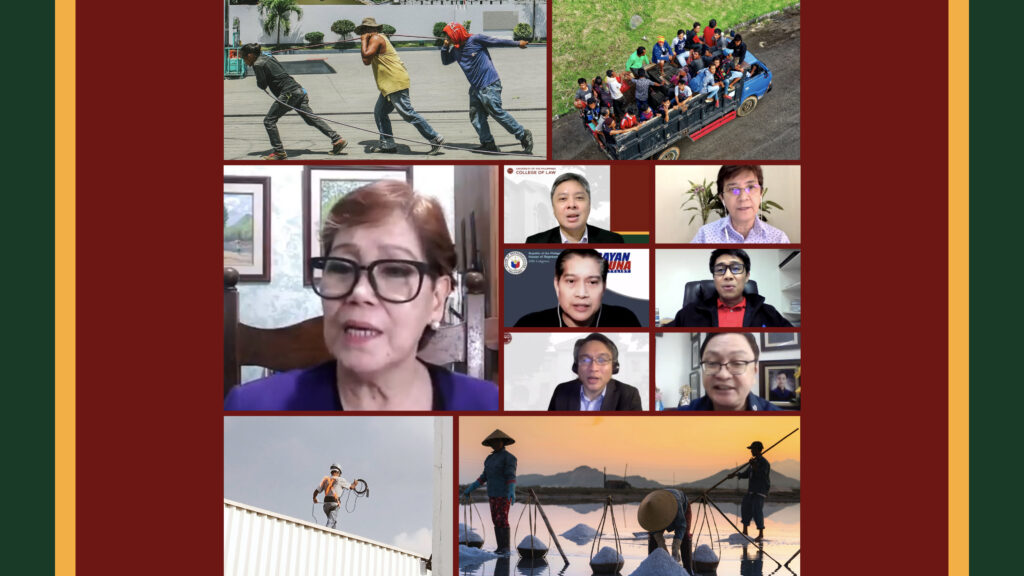
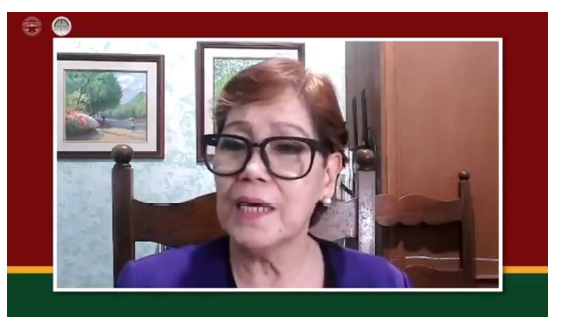
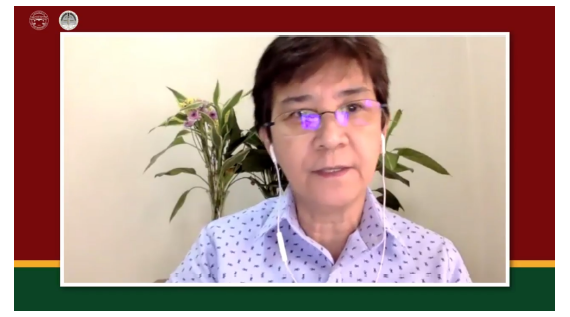
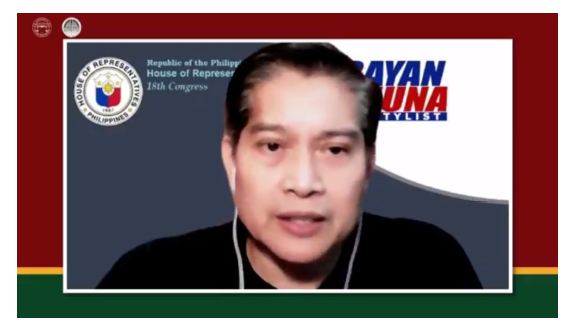
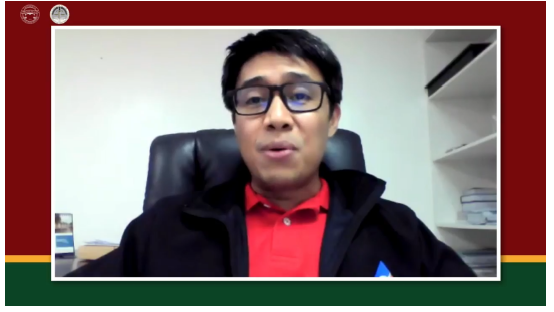
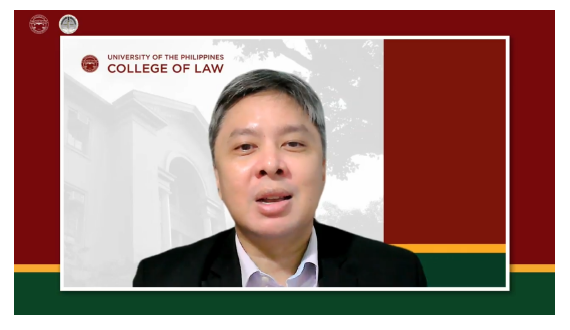

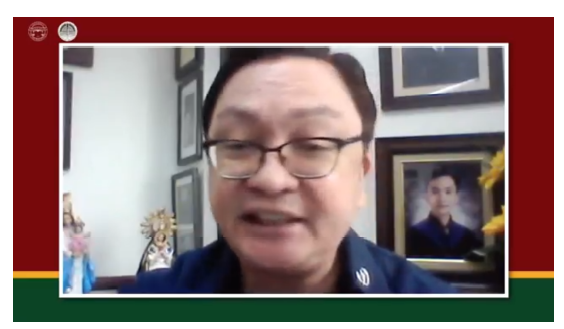
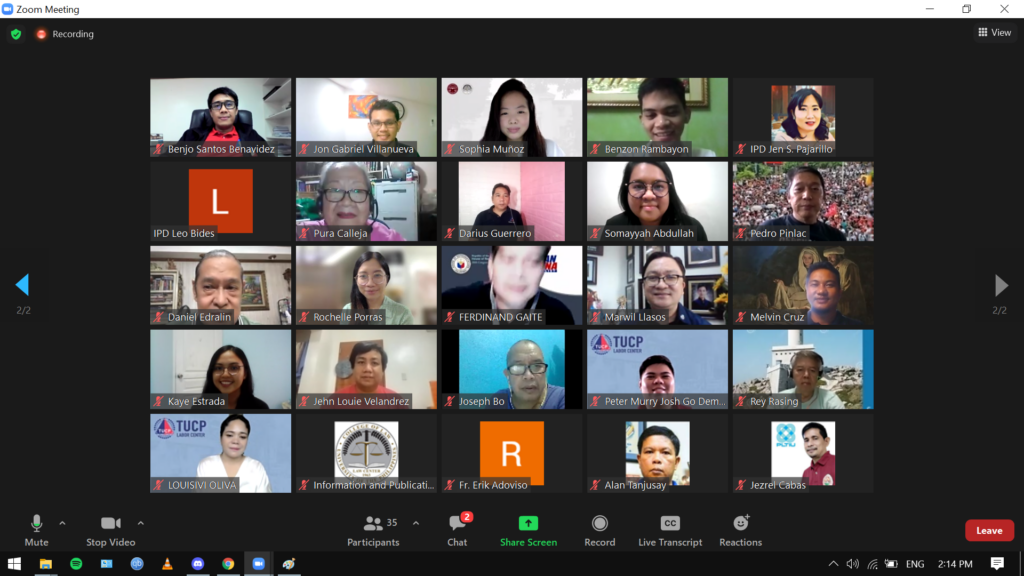
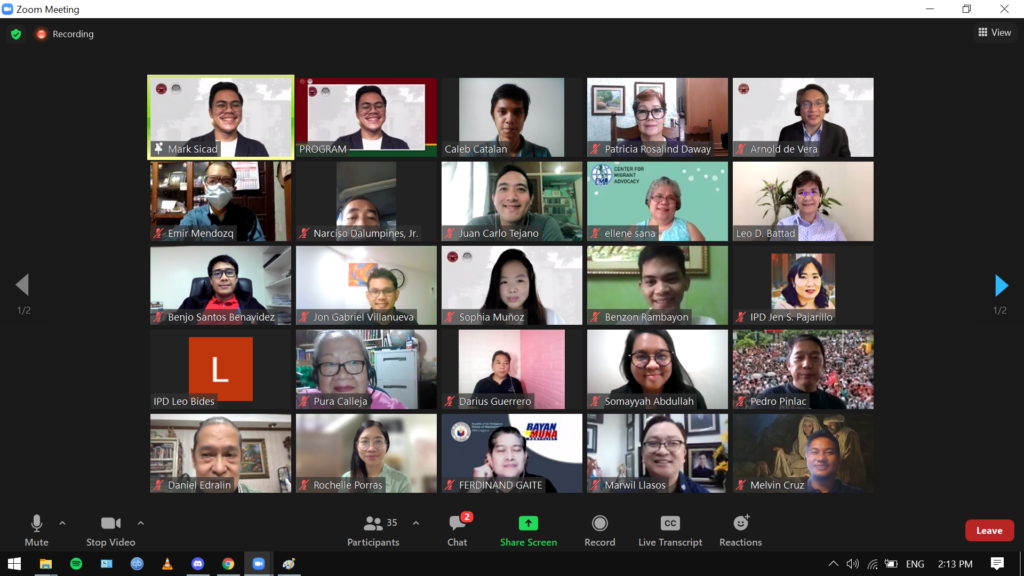
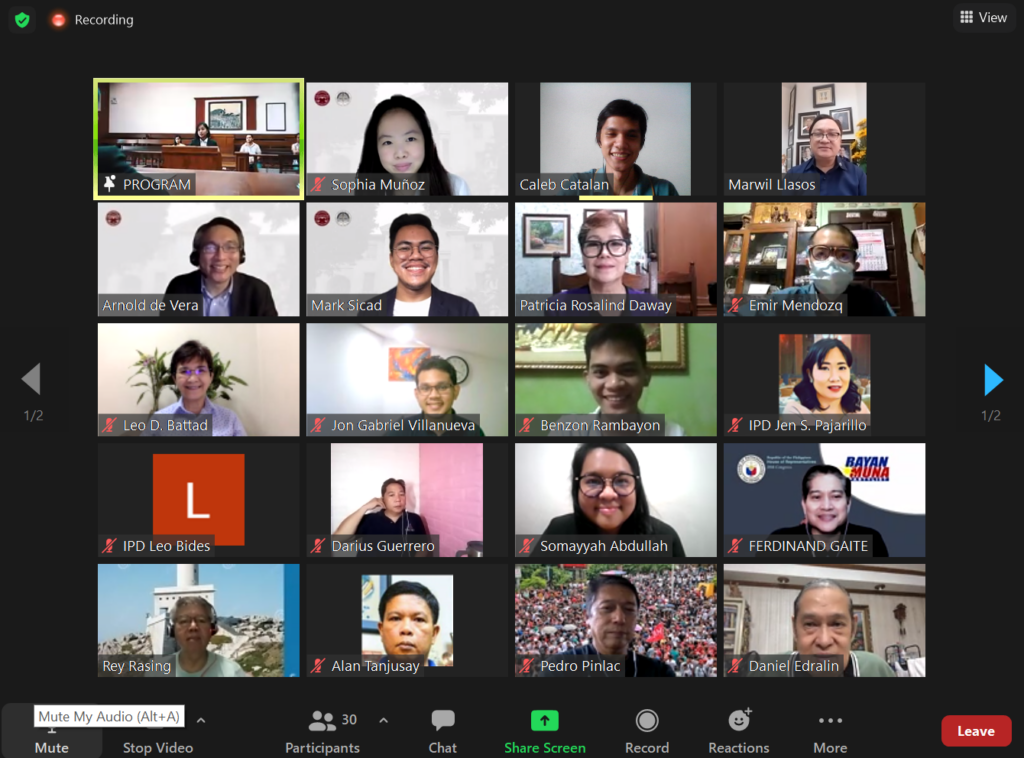
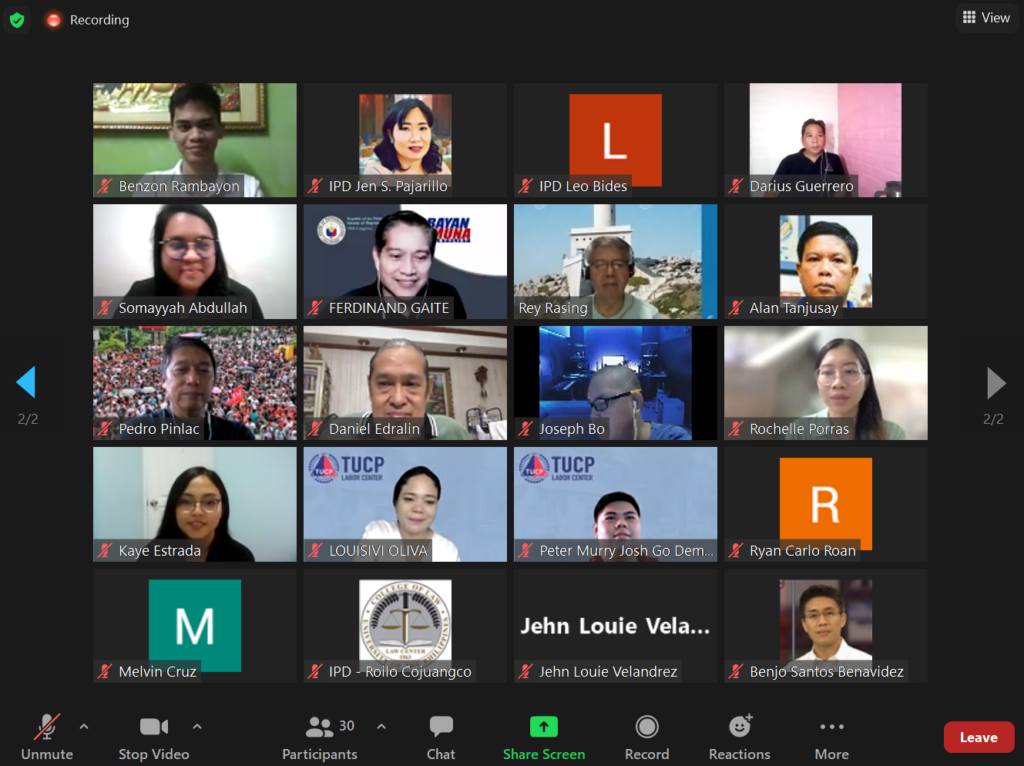






































































































 on the upper right corner to select a video.
on the upper right corner to select a video.